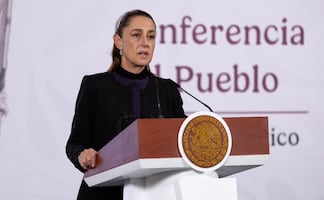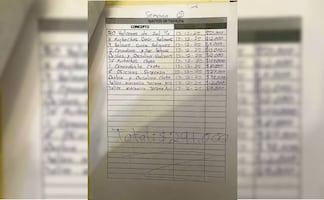Más Información

Narco “La Rana”, entre altar a la muerte, corridos de Los Rayos del Norte, drogas y armas doradas; EU difunde foto de como vivía

Sheinbaum ajusta horario de conferencia mañanera este 26 de febrero; se realizará desde Mazatlán, Sinaloa

Ellos son “La Rana” y “Aquiles”, hermanos Arzate-García, jefes del Cártel de Sinaloa; EU los busca por narcoterrorismo
The U.S. Federal Bureau of Investigations ( FBI ) asked Mexico’s Financial Intelligence Unit ( UIF ) to investigate alleged money laundering operations carried out by a Romanian gang that has been supposedly looting ATMs in Cancun and other touristic destinations in Mexico.
The FBI sent a document to the UIF on February 10, where it asks the Mexican government department to help them track Florian Tudor ’s properties and financial transactions, the alleged Romanian gang leader. U.S. authorities also asked Mexico to investigate Constantin Tiugan and Adrián Ninel Enachescu.
Until now, the UIF has been able to document that the gang members have transferred resources to bank accounts owned by family members, friends, and companies; the money is then used to acquire properties in Mexico and abroad.
According to Mexican authorities, this is the mechanism the Romanian gang uses to launder the money they illegally obtain from ATMs.
Recommended: The Riviera Maya gang: Romanian ATM skimming organization operates in Mexico
Furthermore, the FBI is now investigating Tudor after U.S. citizens filed reports after being robbed while using ATMs in Mexico while on vacations.
According to the UIF, led by Santiago Nieto, the Romanian organization carried out financial transactions with at least 8 companies based in Mexico and one in Romania.
Mexican authorities identified Top Life Servicios as one of these companies. It was created by Adrian Constantin Tiugan in 2013, who faced several international arrest warrants for his involvement in the looting of ATMs in Italy and the Vatican.
Tiugan opened Top Life in Quintana Roo after obtaining a migration permit after stealing Paul Daniel Ionete’s identity, a low-profile Romanian criminal involved in drug trafficking.
In March 2014, Top Life signed a contract with Mexican bank Multiva to install ATMs in different cities.
The Romanian gang controlled around 100 altered ATMs. On average, each machine copied 1,000 credit cards per month, according to a former gang member who is now a witness collaborating with Romanian authorities, who are also investigating the case. The former criminal said that they obtained “USD 200 from each of those credit cards. USD 20 million per month.”
According to an investigation launched by Organized Crime and Corruption Reporting Project, Mexicans Against Corruption and Impunity, Elemento Lab, and the Rise Project, the criminal organization, with branches in three continents, stole around USD 1,200 million from altered ATMs between 2014 and 2019.
The investigation published in June documented that some of the cloned credit cards were used to withdraw money in other countries. The skimmers and other gang members operated in Indonesia, India, Barbados, Grenada, Paraguay, Brazil, Japan, South Korea, and Taiwan.
Recommended: The 6 most common types of fraud in Mexico City
Collaboration between the FBI, UIF, and FGR
Santiago Nieto, the head of the UIF, confirmed that the government department is collaborating with the Attorney General’s Office to investigate the Romanian skimming gang.
The government official said it has identified four people who carry out the frauds by installing altered ATMs in Cancún. Nevertheless, Nieto also confirmed that the FBI requested to collaborate in the investigation against the Romanians .
In April 2019, the FBI allegedly sent a similar request to the Attorney General’s Office to investigate the fraud, the cloning of credit cards, and money laundering.
In the document, the FBI asked Mexican officials to meet with the Romanian police in Bucharest in May 2019, to coordinate and plan an international strategy to investigate the criminal organization led by Florian Tudor.
The FGR launches an investigation
The Attorney General’s Office opened an investigation against the criminal organization led by Tudor but two sources close to the investigation said they couldn’t provide further details or answer questioned submitted by journalists.
The Mexican police have yet to announce why it is investigating Tudor and his partners. According to legal documents, prosecutors describe Tudor as the owner of several companies in Cancun and as the “leader of a criminal group dedicated to cloning credit cards and skimming .”
Authorities set their sights on Florian Tudor since March 2019, when Tudor and his right-hand man were detained while they were on their way to Puerto Morelos. Authorities seized a gun, ammunition, and over USD 25,000.
According to police records, Mexican prosecutors launched an investigation for carrying a gun exclusively permitted for military use. The investigation was still open a year later.
Two months after his detention, Tudor had another run-in with authorities. In May 2019, the police and the army raided his home and Top Life offices in Cancun. Authorities arrested Tudor and five others but they were quickly released.
In July 2019, Tudor filed a request for constitutional protection so that authorities returned the properties seized after the FGR launched an investigation for crimes against biodiversity and operations involving resources derived from illicit sources.
However, Mexican authorities haven’t explained why no one has been arrested one year after the investigation was launched or if the Romanian gang is being investigated for other crimes.
It is also unclear if Romania has asked to extradite Tudor; however, it confirmed that there is an ongoing request for international legal assistance linked to the investigations launched in Mexico.
Although nothing suggests that prosecutors are investigating Multiva’s involvement in the expansion of the altered ATMs network installed by the Romanian gang, the bank informed the National Banking and Securities Commission that it is taking action to determine possible violations of federal financial laws.
gm
Noticias según tus intereses
[Publicidad]
[Publicidad]











